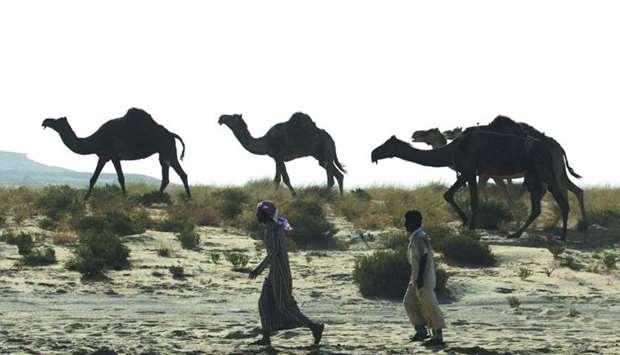Some animals perished when they got stuck at the border between the two countries where there was insufficient food and water.
Others have been left to die by the roadside after their owners were given one hour to leave their farms, the UK-based Daily Mail said in a report.
The animals perished when the Saudis ordered the Qatari owners of more than 15,000 camels and 10,000 sheep out of the country after an economic blockade of Qatar was announced.
More than 9,000 camels were expelled in just 36 hours.
Qatar used the vast spaces of its neighbour, measuring 830,000sq miles, for grazing its animals.
Camel owner Hussein al-Marri from Abu Samra said: “I have returned from Saudi Arabia. I myself saw more than 100 dead camels on the road as well as hundreds of lost camels and sheep.”
Another farmer, who did not want to be named, added: “I lost 50 heads of sheep and five camels and there are 10 missing. I do not know anything about them.”
Video footage showed them herded into huge pens after restricted border opening hours meant only a few hundred could cross each day, and many died of thirst or untreated injuries.
Heartbreaking footage showed animals succumbing to the harsh conditions, including one female camel which died while giving birth.

Facilities for livestock provided by the Ministry of Municipality and Environment.
Local reports said “as many as 100 baby camels died during the arduous journey back to Qatar”.
Another camel owner, Said al-Hajri, said: “It was hard, the camels were exhausted because they did not know which way to go.
“Many died and many had broken legs and injuries, and some of the camels are lost.
“Some of the calves need their mothers' milk and they may die.”
Last month, the Saudi Arabia-led bloc imposed a diplomatic and transport blockade on Doha.
At the same time, it ordered all Qataris out of the country, including nomadic farmers and their animals.
Within days of the initial order, some 15,000 camels and 10,000 sheep had passed safely back into Qatar.
Herds of animals were still being brought back into the country by farmers two weeks after the crisis began.
But many perished in the desert as temperatures hovered around 45C.
Farmers said the situation would have been a lot worse had the Qatari government not intervened.
Many animals were saved when the environment ministry provided emergency shelter for more than 8,000 camels on the Qatari side of the border with water and food.
The ministry did a lot to help by offering free fodder and water, “so we appreciate the government for responding quickly”, said an owner.
The livestock and their animals had been given temporary shelter in southwestern areas of the country.
Officials also said specialist teams of animal experts and veterinarians had been assigned to the farmers.
They added that there were now more than 1mn animals in Qatar, the vast majority of them sheep and goats.
There were also around 70,000 camels.
A spokesperson for international animal charity SPANA said: "All too often around the world, working animals and livestock become the forgotten victims of conflict and political disputes. It's a situation we've seen countless times before – in Somalia, Mali and many other locations. It is critical that the welfare of animals is prioritised and that they receive essential requirements such as food, water, shelter and access to veterinary care."
There are still 150,000 Qatari camels in Saudi Arabia and it is not clear when or if they will be expelled, the report adds.

Camels cross Saudi Arabia's remote desert border into Qatar on June 20.
Hundreds of camels have died of starvation and thirst after being driven out of Saudi Arabia during its current rift with Qatar.


